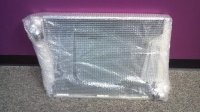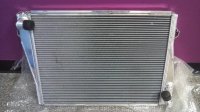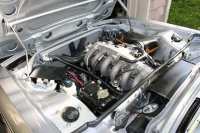Much cheaper than copper.... Most of the newer vehicles benefit greatly from aluminum radiators for durability, rather than performance reasons. .
Cost and weight are two reasons for using aluminum:
- Currently, the spot price for Cu is $3.44/lb, while Al is a quarter of that, $.85/lb.
- Pure copper weights about 3.2X as much as pure aluminum (.31 lb/cu in vs. .098 lb/cu in). Of course, these numbers would vary a bit for the the alloys used to build a radiator. Still, for the same material thickness and dimensions, an aluminum radiator would certainly be lighter.
Older cars with fully-metal radiators (like ours) can see performance improvements due to better core designs, better manufacturing methods, and reduced material requirements (thin walls mean better thermal gradient, which means better heat transfer if conductivity is constant).
Yea, except that thermal conductivity isn't constant - as I wrote in post # 15, for a given thickness, aluminum has about half the thermal conductivity of copper. So the material in a hypothetical aluminum radiator would have to be about half as thick as that in a copper radiator to dissipate heat at the same rate. Since aluminum is stronger, the thickness probably can be reduced somewhat, though probably not by 50%.
An auto manufacturer can design a new car to accommodate a larger radiator to offset the lower heat conductivity of aluminum. At 1/4 the price and 1/3 the weight, a larger aluminum radiator would still compare favorably. But when retrofitting an aluminum radiator into an existing car, you can't simply increase its size.
Please understand that I am not trying to be critical of draleu or his product. I'm sure aluminum radiators are stronger, lighter, and look totally cool. I just wanted to understand under what circumstances aluminum would make a better radiator material than copper.



